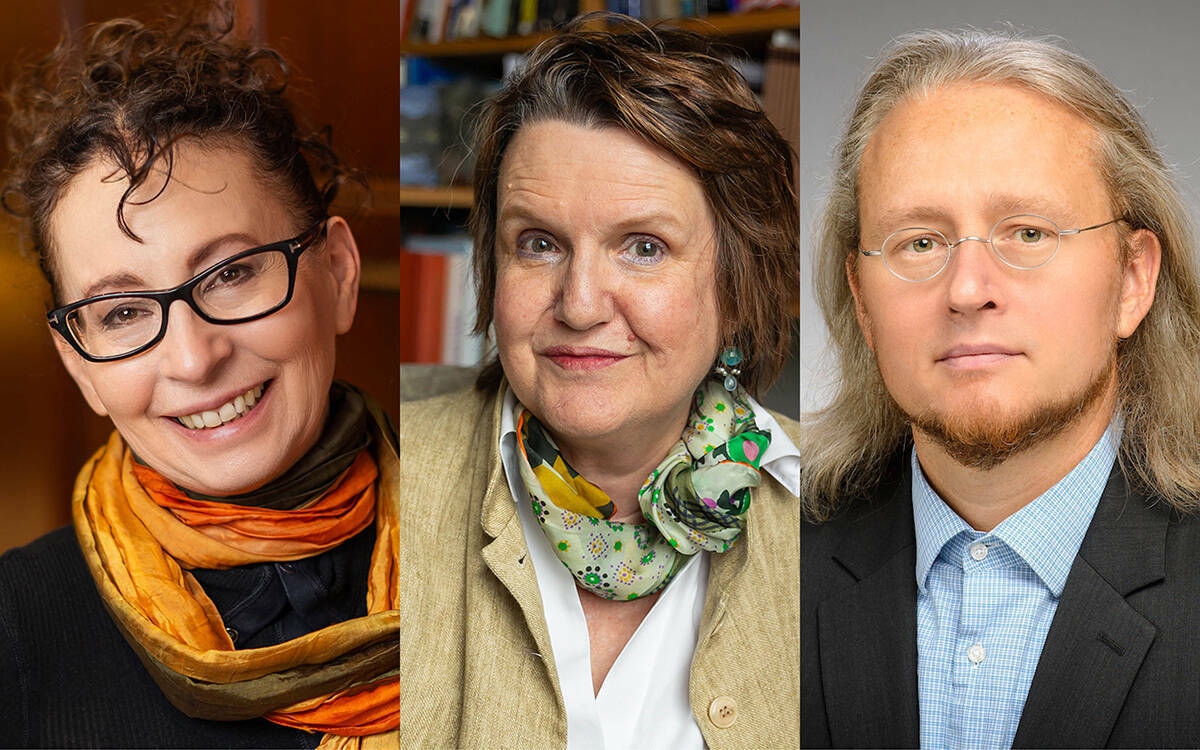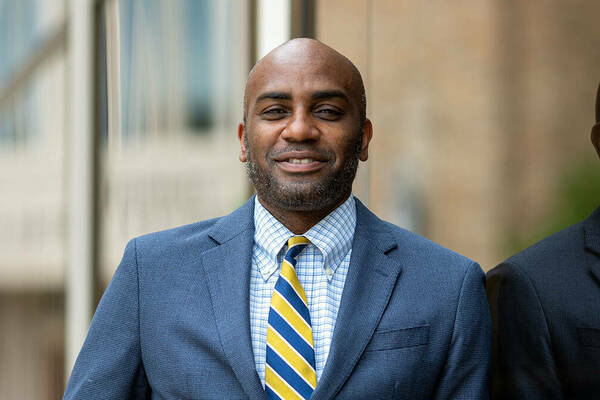
Three faculty members in the College of Arts & Letters have been awarded 2024 Guggenheim Fellowships in recognition of their career achievements and exceptional promise.
Barbara Montero, a professor of philosophy; Gretchen Reydams-Schils, a professor in the Program of Liberal Studies; and Roy Scranton, an associate professor of English and director of the Creative Writing Program and the Environmental Humanities Initiative, are among the 188 scholars, scientists, and artists chosen from approximately 3,000 applicants for the fellowship created to add to the educational, literary, artistic, and scientific power of the country.
“I am thrilled that three of our faculty members have joined the prestigious ranks of scholars who have had their research supported by the Guggenheim Foundation," said Sarah Mustillo, the I.A. O'Shaughnessy Dean of the College of Arts & Letters.
”This is a high honor and tremendous recognition of the ambitious, valuable scholarship that is being done by Arts & Letters faculty across our humanities disciplines.”
Twenty-two Notre Dame faculty members have won Guggenheims in the past 24 years. Other recent awardees include English professor Joyelle McSweeney in 2022 and Pam Wojcik, the Andrew V. Tackes Professor of Film, Television, and Theatre and department chair, in 2020.
“I am thrilled that three of our faculty members have joined the prestigious ranks of scholars who have had their research supported by the Guggenheim Foundation." - Sarah Mustillo, the I.A. O'Shaughnessy Dean of the College of Arts & Letters.
Now in its 99th year, the Guggenheim Foundation has granted more than $400 million in Fellowships to more than 19,000 people, including 125 Nobel laureates and winners of the Pulitzer Prize and National Book Award.
Guggenheim Foundation President Edward Hirsch said the fellows are meeting the profound existential challenges facing humanity head-on and are “generating new possibilities and pathways across the broader culture.”
Things that matter
During Montero’s fellowship, she will write a draft of a book, tentatively titled “Things that Matter: Actual-World Metaphysics and the Mind-Body Problem.”
Montero read Tim Crane and Hugh Mellor's article, "There is no question of physicalism" when she was a graduate student and was inspired to think about the question of what, exactly, we mean when we talk about the physical world. She’ll grapple with that question in the book, which is currently under contract with Oxford University Press.
“I was also inspired by the Spanish philosopher, classicist, and writer Miguel de Unamuno's comment that those things that are deemed ‘not even worth refuting,’ are sometimes the very crux of the issue,” she said. “I hope to be addressing some of those things.
Montero’s prior research has focused on two different notions of the body — as a physical or material basis of the mind and as a moving, breathing, flesh, and blood instrument that people use when they run, walk, dance, and play.
‘Becoming like God’
In “‘Becoming like God:’ Perfection in Platonism and Stoicism (1c. BCE-2c. CE),” Reydams-Schils will seek to retrieve aspects of human perfection in antiquity that are empowering and relevant.
“The project yields a distinctive model of ‘self,’ the constitution of a human being, and virtue,” she said. “This model invites us to see ourselves as fundamentally embedded in the order of the universe and as being part of a densely woven fabric of social relations.”
In our current context, and in the sphere of human action, Reydams-Schils said, perfection can be seen as imposing a literally inhuman standard, which is unattainable, destructive, and an impediment to human happiness and flourishing.
Reydams-Schils, who has concurrent appointments in classics, philosophy, and theology, said the fellowship is a validation of her vision for an interdisciplinary approach to ancient philosophy.
“My career narrative is also an ode to my department, the Program of Liberal Studies,” she said, “for the intellectual freedom it gave me to pursue this vision.”
‘Precarious, uncertain future’
Scranton’s project is about the survival of the planet. The essayist, novelist, literary critic, and climate philosopher argues that climate change not only exceeds our political, technological, and cultural capacities for addressing it, but that it actually transcends our ability to even understand what's happening.
“The best response to this problem, I argue, is a form of virtue ethics I call ethical pessimism,” Scranton said. “Pessimism, much more than optimism, offers the best way to navigate our precarious, uncertain, and dangerous future.”
In the decade that Scranton has been writing about climate change in the public sphere, he said, he’s watched everything get worse.
“The Guggenheim Fellowship is a very highly prestigious honor that represents a major achievement for these faculty members.” - Josh Tychonievich, associate director for research development at ISLA.
“Emissions have increased, impacts have increased, self-delusion has increased, apathy has increased, political polarization has increased, and our confusion and fear have increased,” he said.
“‘Ethical Pessimism: Climate Change and the Limits of Narrative’ is an attempt to reckon with our global political failures, and inject a little intellectual humility into the conversation.”
Developing research culture
The College of Arts & Letters’ Institute for Scholarship in the Liberal Arts offers support to faculty across the arts, humanities, and social sciences in applying for major national and international fellowships, including the Guggenheim.
In April 2022, ISLA hosted a webinar during which faculty met with André Bernard, vice president of the Guggenheim Foundation. Last fall, ISLA compiled and shared an online resource kit for A&L faculty and continued providing support and feedback to applicants preparing competitive proposals.
“The Guggenheim Fellowship is a very highly prestigious honor that represents a major achievement for these faculty members,” said Josh Tychonievich, ISLA’s associate director for research development.
“Only about 6% of applicants in a given year are awarded a fellowship. That three of these fellowships were awarded in Arts & Letters attests not only to our outstanding faculty but also to the strong research culture of the College.”


